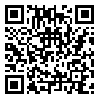

BibTeX | RIS | EndNote | Medlars | ProCite | Reference Manager | RefWorks
Send citation to:
URL: http://jdisabilstud.org/article-1-3218-en.html
2- Full Professor, Department of Psychology, North Tehran Branch, Islamic Azad University, Tehran, Iran
3- Assistant Professor, Department of Psychology, Faculty of Humanities, The Imam Hossein Comprehensive University, Tehran, Iran
Abstract
Background & Objective: Social anxiety disorder is the most common anxiety disorder whose main feature is fear or severe anxiety. Anxiety sensitivity as a cognitive and mediating variable plays an essential role in the occurrence of mental disorders, including social anxiety disorder. A growing body of research supports the role of anxiety sensitivity in social anxiety disorder. A high prevalence of social anxiety disorder has led to the development and expansion of new treatments for this disorder. Some previous studies have shown that paradoxical timetable therapy (rooted in psychodynamic and systemic theories) and virtual reality technology therapy (in which the basic techniques of psychotherapy are simulated with the help of modern technologies) can reduce the symptoms of social anxiety disorder. Considering the research gap in comparing these two types of treatments in reducing anxiety sensitivity, the present study was conducted to compare the effectiveness of paradoxical timetable therapy and virtual reality technology on the anxiety sensitivity of patients with social anxiety disorder.
Methods: This quasi–experimental research was conducted with a pretest–posttest and a one–month follow–up design with a control group. The statistical population included all people referred to counseling centers and psychotherapy clinics in Tehran City, Iran, from September 23, 2022, to March 20, 2023. The study sample consisted of 45 qualified volunteers diagnosed with social anxiety disorder based on the initial interview and social anxiety scale. They were selected by available sampling and randomly assigned to three groups of 15 people each (two experimental groups and one control group). The Anxiety Sensitive Questionnaire (Taylor & Cox, 1998) was used to collect data. The revised anxiety sensitivity index has a four–factor ordinal structure. These factors include fear of respiratory symptoms, fear of anxiety reactions, fear of cardiovascular symptoms, and cognitive dyscontrol. The reliability of this questionnaire in the present study was 0.92. The first experimental group undertook six 90–minute paradoxical timetable program therapy (Besharat, 2019), and the second group received eight 45–minute virtual reality technology therapy sessions (North, North & Coble, 2017). The control group did not receive any intervention. The obtained data were analyzed using repeated measure analysis of variance. The significance level of the tests was considered 0.05. The inclusion criteria were as follows: suffering from social anxiety disorder based on the diagnostic interview and the social anxiety scale questionnaire (with a score of at least 50), informed consent to participate in treatment and research sessions, aged 18 to 50 years, having minimum degree of diploma, no concomitant use of psychiatric drugs, and without other clinical or chronic physical disorders (such as cardiovascular diseases). The exclusion criteria were not participating in more than two treatment sessions, the occurrence of severe stressful events in life (such as divorce or death of first–degree relatives) during the research process, and unwillingness to continue the treatment.
Results: The results showed that both types of paradoxical timetable therapy and virtual reality technology reduced anxiety sensitivity in people with social anxiety disorder (p<0.001). The non–significance of the mean difference between the posttest and follow–up phase also shows the permanent effect of the two therapeutic methods of paradoxical timetable and virtual reality technology therapy on anxiety sensitivity and its components one month after the end of the implementation period. Based on this, the results of the present study showed that the two methods of treatment have reduced the average anxiety sensitivity and its components in a stable manner; however, the effectiveness of the paradoxical timetable therapy was higher.
Conclusion: Based on the research findings, the treatment of paradoxical timetable was more effective in reducing anxiety sensitivity than the virtual reality technology intervention. Therefore, therapists can use the mentioned treatment to reduce anxiety sensitivity in patients with social anxiety disorder.
| Rights and permissions | |
 |
This work is licensed under a Creative Commons Attribution-NonCommercial 4.0 International License. |



